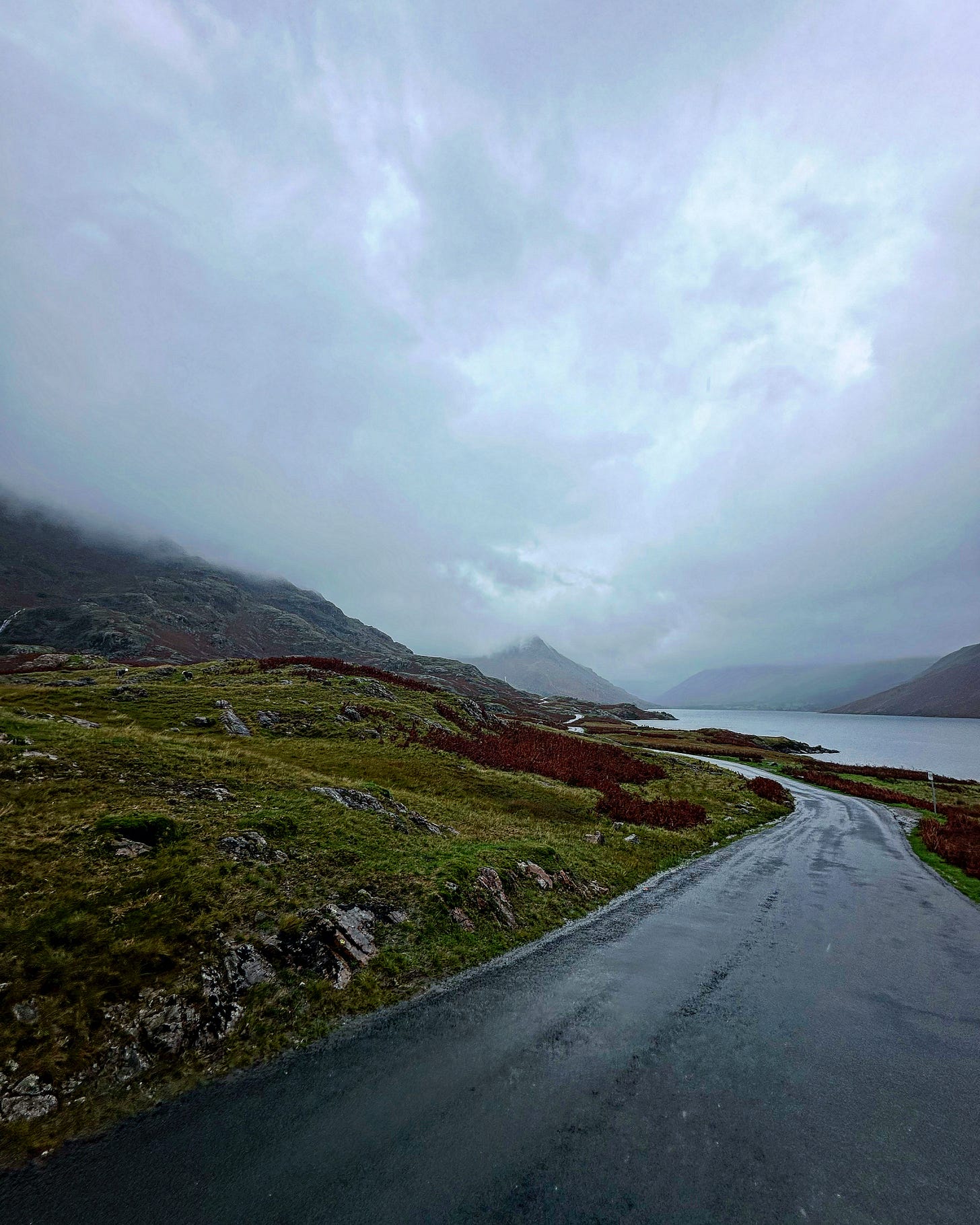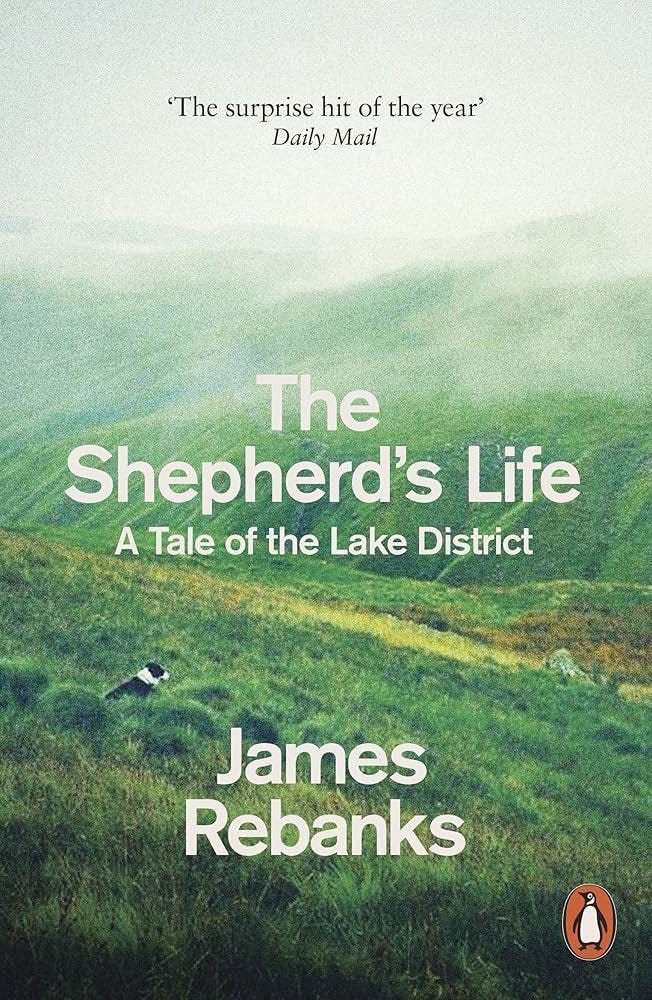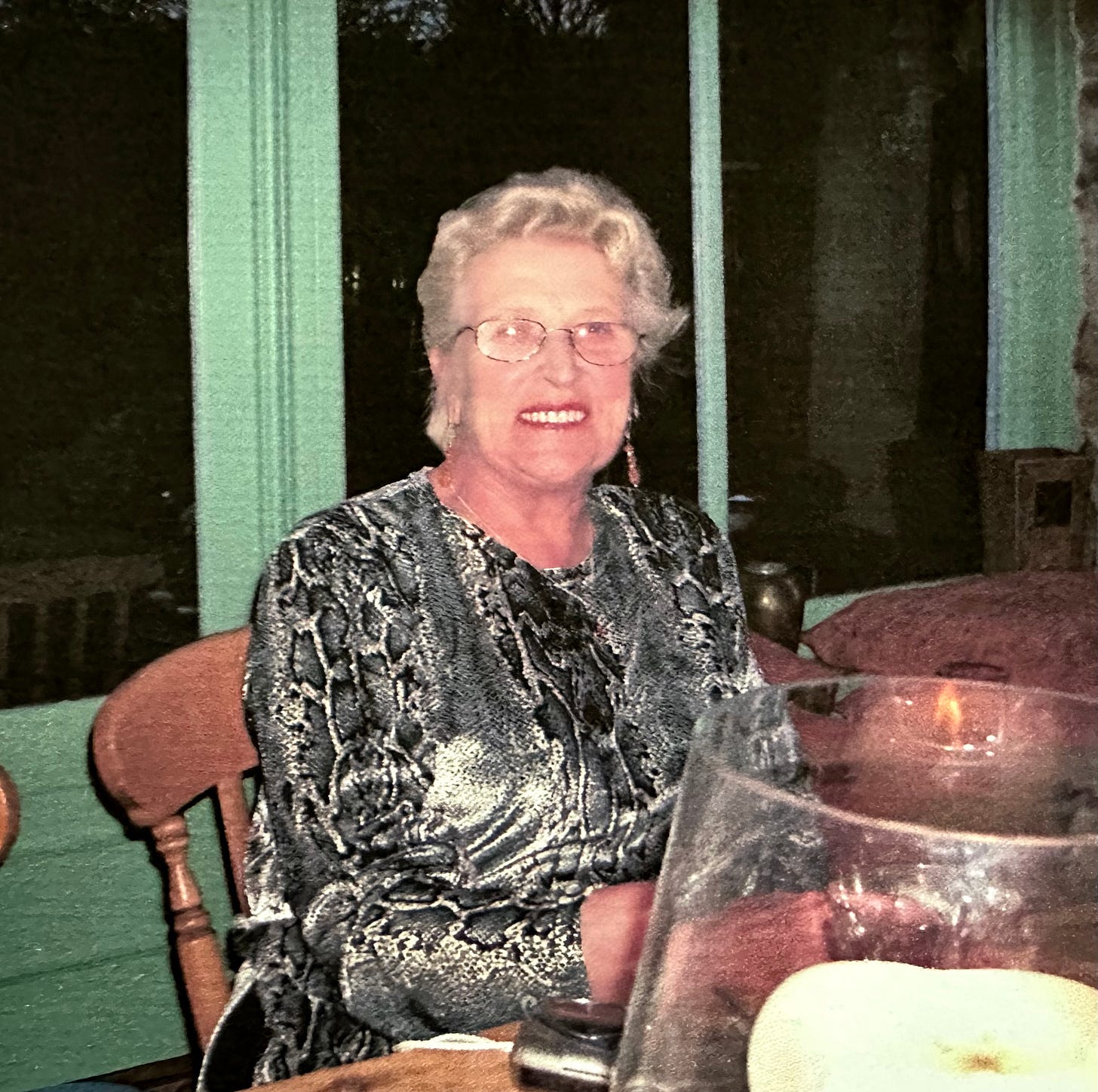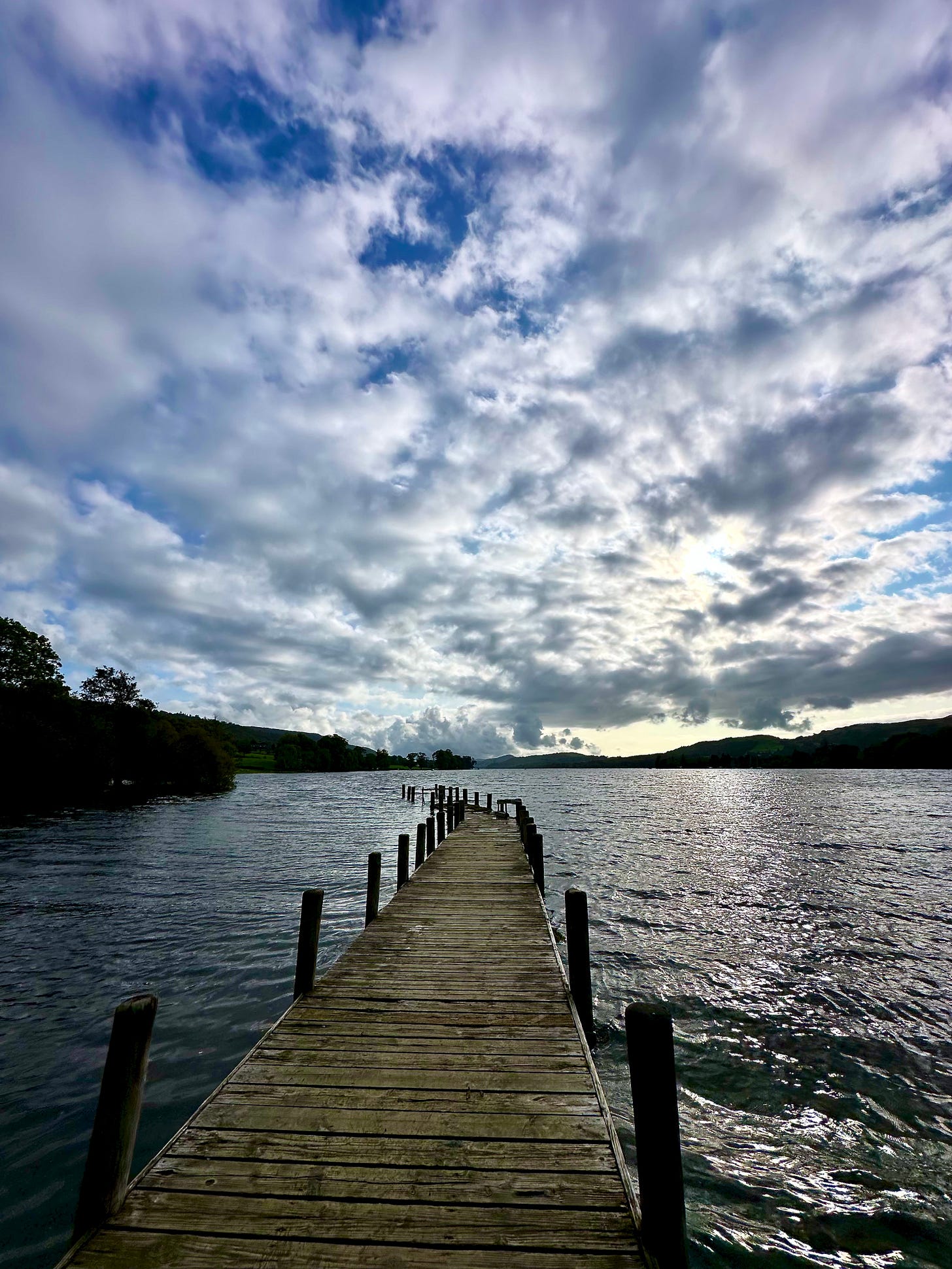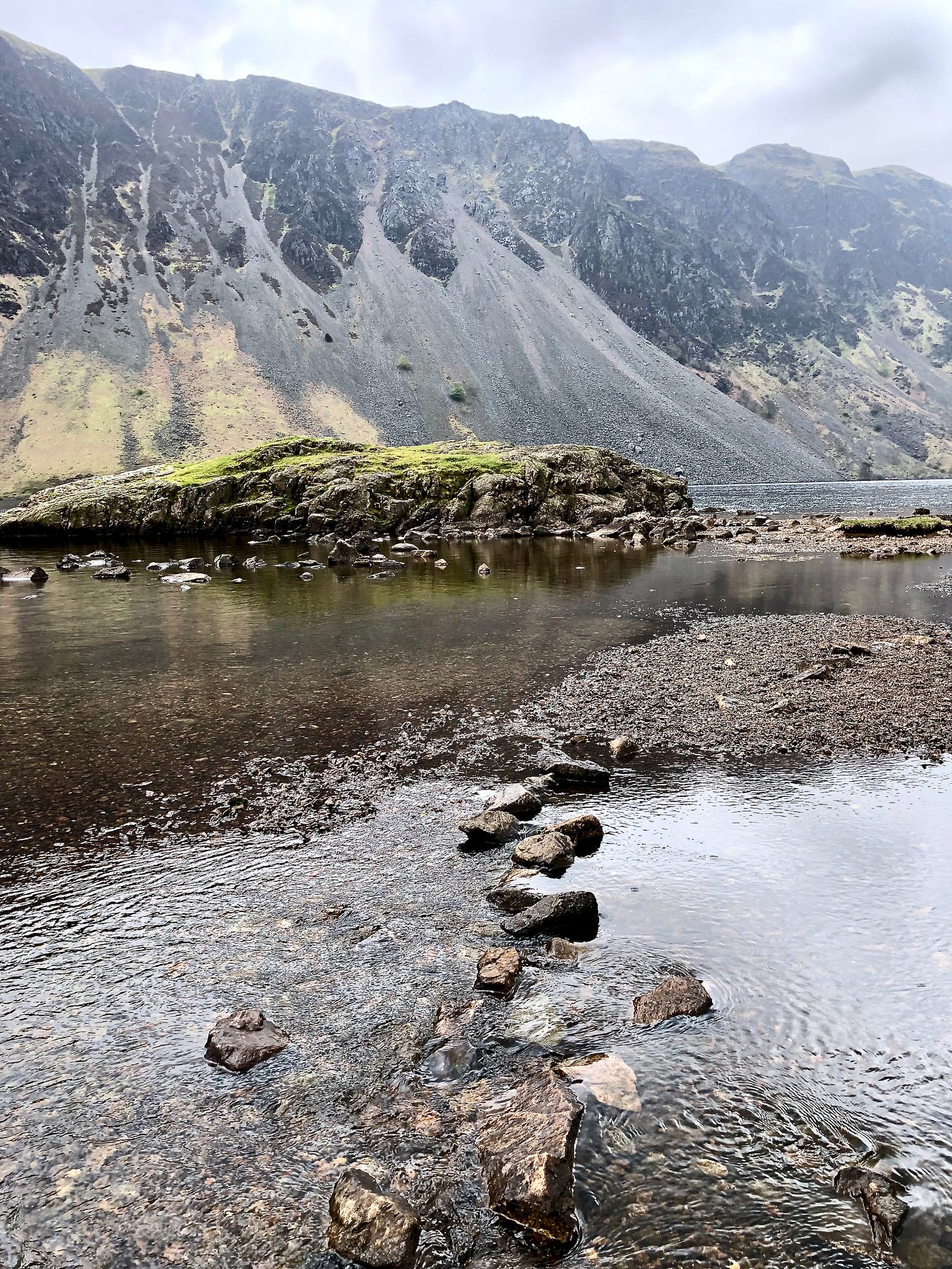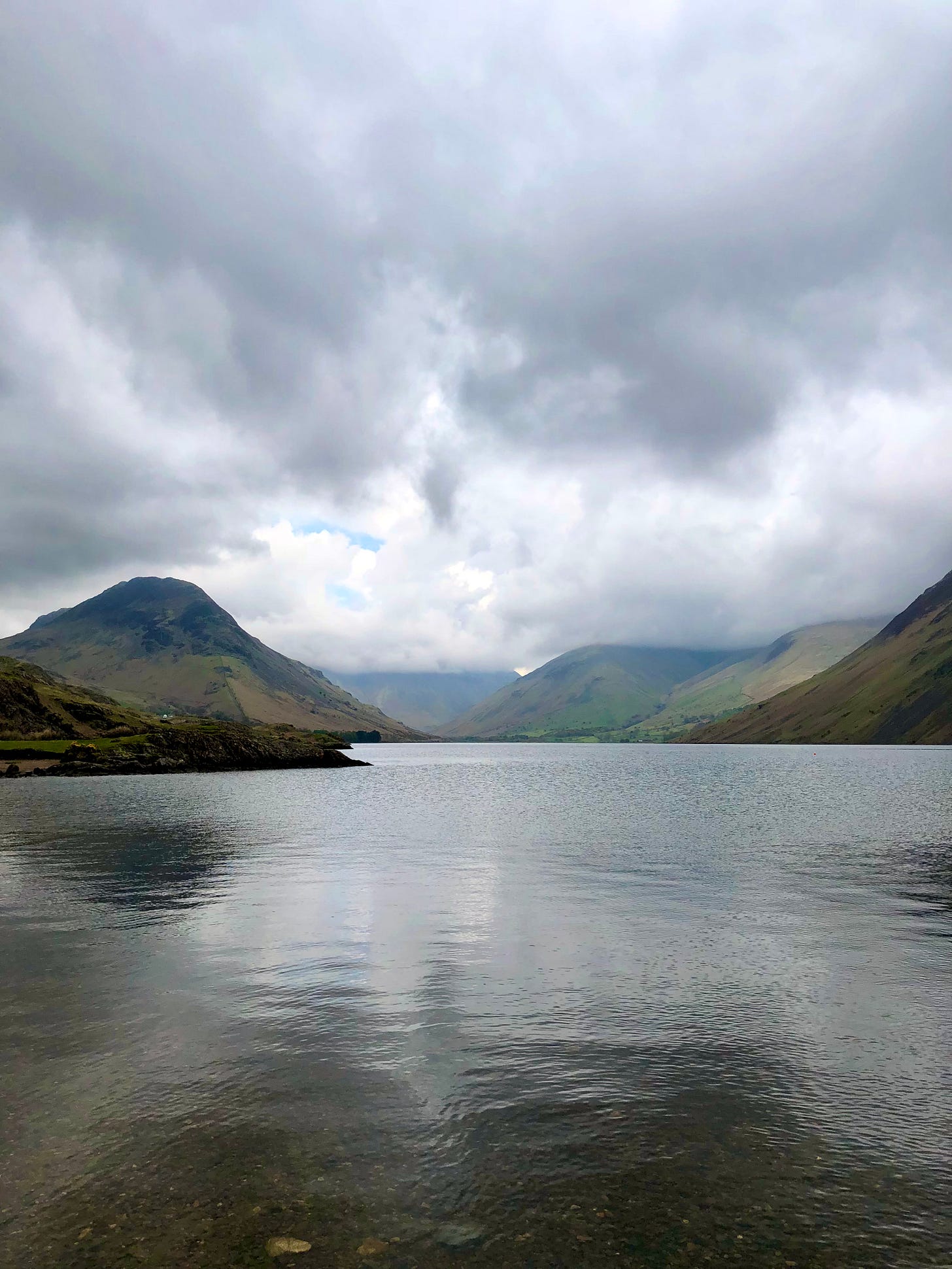Wast Water I made her drive those winding roads up past Nether Wasdale, on holiday with my mother, a nervous driver at the best of times. I had heard that Wast Water was the highest and the deepest lake and we ascended to it by narrow lanes through crag and farm. Nothing prepares you for its isolated bleakness, the great sepulchral screes pouring down into troubled gunmetal waters. We sat on its banks dwarfed by the mountains at its far end, Great Gable, Scafell Pike, Great End, Bowfell, Esk Pike, and Crinkle Crags. I stood for a photo with a recent purchase, a shepherd’s crook that I thought made me look like a modern-day John the Baptist. It seemed right in that wilderness to conjure an eremitical figure, but really, my mother was more conversant with the starkness that the lake augurs. Now I return to that bleakness of dark slate and ominous cloud with my wife, coffees bought at the shiny new Sawmill cafe. The rain buffets the car as we sit with the black Border Collie straining to be let out into all that elemental fearfulness. Now older we are both familiar with the excoriation of grief, the exfoliation that breaks off slivers, reflected in all those screes. Getting out, feeling the slap of rain on our faces, stinging us with our insignificance, in the face of gorse, mist and deep. This bleakness of Wast Water is something we return to over and over, its vast brooding presence offering a fierce solace. We cannot stay too long in its feral embrace, we are too frail, but it reminds us that we have endured fierceness and survived. That in its sublimity we are held and even eroded towards our essence and its soaking washes us deeper and deeper into our selves.
I first visited Wast Water when I was around 22 years old. I was in the first flushes of an experimental religious life, trying to emulate St Francis of Assisi in the South Yorkshire mining town of Maltby. Every summer we were granted a couple of weeks holiday from the rigours of two hours mediation a day and living on next to nothing.
I asked my Mother if we could go somewhere that would be a break and not be too luxurious. She contacted one of her old friends from the Women’s Royal Navy (WRENS) called Mary. She and her husband Dennis (also ex Navy) had moved to a small holding above Coniston Water called Yeat House. They wrote back that they would have us and so off we went in her little black Honda Civic.
It was my first experience of the Lake District. As my friend David Whyte says: ‘everywhere your eye falls in the Lakes, it falls on something beautiful.’ The crags and fells of the natural environment, the dry stone walls and the slate cottages of the human one all conspire to enchant. Dennis and Mary, along with their lovely little cottage, had a few acres with some sheep and a singular black and white border collie called Sam. On the day we arrived I wrote, piously, in my journal a quote from the psalms.
I will lift up mine eyes unto the mountains, from whence cometh my help. My help comes from the LORD, who made the heavens and earth.
Psalm 121
I experienced a feeling I had never had before in my short life, one of homecoming. I felt wrapped in the place, embraced by the elements, and even more miraculous, the sense of being loved by a four legged creature. I would sally forth every afternoon with the dog, up into the bracken clad fells and fall in love just a little bit more with the muzzle and paws, the licking and boundless energy of a working border collie. James Rebanks who has written one of the best books I have ever read about the Lakes - ‘A Shepherd's Life’, comments that the border collie runs five miles to the shepherd’s mile, that sheep farming in the lakes would be unmanageable without dogs. Four by fours and even quad bikes cannot get where a sheep can and therefore a sheepdog must.
My religious devotion meant that I felt it was imperative that I had to go to church every day. So I made my poor mother get up at the crack of dawn to attend the little catholic church of the Sacred Heart for the morning mass. My Uncle Dennis and Auntie Mary pleaded with me to have a break and therefore give my mother a break. I, however felt that I would be a backsliding in my religious life if I relented and also that I was somehow bearing witness to may faith. I am astonished at my own pomposity and feel regretful as I think back to those days.
What amazes me, and I try to reflect this in the poem, is that my unconscious self and the natural world around me were conspiring to create another type of devotion in me. It is nature that has the power to reshape us and for all my pious attendance of worthy Catholic liturgies they had not the power to wreak a change in me as the Lake District wielded. It was a slow and uncanny courtship and it has taken until these last ten years to consummate it. It has taken a breakdown, a night sea journey and a reconstruction around the deeper values of the soul for me to see what started all those years ago.
Though I loved the walks with the dog and evenings by the fire with Dennis and Mary, another desire awoke in me, to see the wild. My poor long suffering Mother who as I commented was a nervous driver, was dragooned into some of the most hairy drives the Lakes has to offer. I, at that time could not drive. It took a lot of other people’s time and energy to keep me in my poverty. She traversed the Kirkstone Pass to Ullswater, the Hardknott Pass and the Wrynose Pass that took us to one of the wildest places in the Lakes.
Two experiences came to me in that first holiday and they return each time I go to the Lakes and often in my own Peak district. The great poet of the Lakes says it better than I can.
Fair seed-time had my soul, and I grew up
Fostered alike by beauty and by fear,
Much favoured in my birthplace, and no less
In that beloved vale to which erelong
I was transplanted.
From The Prelude
Beauty and fear. The first was around me every morning as I awoke and we drove to the Church past Coniston nestling under the Old Man, as I walked the bracken clad crags with the dog, as I sat on the rocks above Yeat House watching the sun set in glory. Strangely I only really appreciated this when I moved to the East End of London to study theology and philosophy and I realised how starved I was of this kind of beauty.
The latter came to me when I read in one of my Uncle Dennis’s guide books that here there was a Lake called Wast Water and it was both the highest and deepest. I plotted the course in my Mum’s road atlas and made sure we would go over the Wrynose Pass and the Hardknott Pass. We called into Ambleside to stock up on provisions for a picnic and I bought a lovely wooden Shepherd’s Crook (or rather as I had no money my Mum bought it), which I still have today.
Nothing prepares you for its
isolated bleakness, the great
sepulchral screes pouring down
into troubled gunmetal waters.
This is how I introduce the Lake in my poem. It is a fearful landscape, it inspires awe and makes you feel small and insignificant. If I were being lofty I might call it sublime. Here is the etymological origin of the word as described by Assistant Professor Simon Morley.
‘Etymologically it comes from the Latin sublimis (elevated; lofty; sublime) derived from the preposition sub, here meaning “up to,” and, some sources state, limen, the threshold, surround or lintel of a doorway, while others refer to limes, a boundary or limit..
He goes on to outline what Edmund Burke writing in 1757 said.
‘Burke was interested in what happens to the self when assailed by that which seems to endanger its survival. He also moved the analysis away from the sublime object and towards the experience of the beholder, thus making his enquiry a psychological one. The sublime, declared Burke, was the strongest passion.’ 1
As we sat, my mother and I, on the little outcrop eating our sandwiches, me posing with my new staff we had to fight off the overpowering sense of the sublime. Only now do I realise that the starkness of the lake raised echoes of my Mother’s journey into depression and loneliness. We were both moved and a bit scared by the place. Words like sublime are easy to throw around in literary criticism but here, in the experience of the beholder, I realise now my lovely mum had been up to the threshold that this deep lake, surrounded by the highest peaks of the Lake District portended and signified. Twice in my late teens she tried to take her own life. She had a stay in a mental hospital. She knew the sublime.
When I returned to the Lakes with my family and as a guide with David Whyte, I went back to Wast Water. In fact my wife and I have made it a kind of ritual for our last day in the lakes, we head over to Eskdale and the little Sawmill cafe that has opened in Nether Wasdale. We buy a picnic and then park halfway up the lake and walk the dog and eat our lunch. We too have now seen our fair share of that internal threshold that opens on the precipice of human anxiety and depression. What our visits to the fierce solace of Wast Water tell us, as I think it did my mother, was that we have come through these night sea journeys and we are all the more ready to find hope in beauty and a deeper connection to our own souls when faced with such sublimity.




